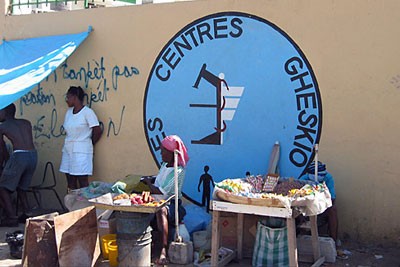University reaches out to Cornell students, staff in Haiti
By Joe Wilensky
Five Cornell students and staff members who were in Port-au-Prince, Haiti, working at the Weill Cornell-affiliated GHESKIO clinic during the Jan. 12 earthquake, were safe as of Jan. 14.
"The reports of devastation and suffering in Haiti are heart-rending," said Tommy Bruce, vice president for university communications. "We want to express our heartfelt sympathy and deepest concern for the people of Haiti, our students and colleagues in that country, and all those who have been affected by this disaster."
A university official cautioned that the situation in the devastated nation remains dangerous and is likely to worsen in the coming days.
"This is just the first wave of this disaster -- it's going to get much worse, unfortunately," said Allen Bova, Cornell director of risk management and insurance.
Two graduate students who were working at the clinic -- one a Ph.D. candidate in the Division of Nutritional Sciences at Ithaca -- and at least one staff member "took the initiative" and made it safely to the French embassy Wednesday night (Jan. 13), and were awaiting evacuation, Bova reported.
The earthquake, which is believed to have killed thousands, destroyed countless buildings, cut off and disrupted electricity and the water supply, and damaged and toppled cellular network towers.
University officials worked around-the-clock earlier this week just to determine whether the Cornell students and staff known to be in the country were accounted for.
GHESKIO, a leading Haitian health clinic in downtown Port-au-Prince, was founded by Dr. Jean Pape, a 1975 graduate of Weill Cornell Medical College and now a professor of medicine at WCMC. In a message posted on Weill Cornell's global health page http://weill.cornell.edu/globalhealth/, Pape reported that walls at the clinic collapsed and that his knee had been slightly injured by a piece of concrete that fell from a ceiling, but that he had heard from most of the clinic's staff and that they are safe.
In addition to the students and staff at GHESKIO, Bova said that five undergraduate and two graduate students at Cornell are Haitian citizens, but as of early Jan. 14, he said that the university didn't yet know whether any of them were in Haiti during winter break.
"We hope and pray that they're all right," Bova said. "Their families certainly have been impacted.
"We're following the situation very closely, and we have expended a lot of effort to find out if all our folks are okay in Haiti," Bova said. Staff in Ithaca is working with International SOS, the university's travel assistance company, as well as families and staff at WCMC.
"There are a number of obstacles yet to be overcome," Bova said. "Whenever the university is faced with a situation like this, there is a tremendous effort by countless numbers of folks to gather information, and to communicate with parents and relatives and emergency service providers to try to ensure, as much as possible, that folks are able to get out of dangerous situations."
The breakdown of communication networks and the Haitian physical infrastructure is really the biggest challenge to getting information, Bova said. "It really limits your ability to respond."
Despite the challenges, Bova said the Cornell students and staff in Haiti "will be evacuated. [It's] only a matter of time. We hope sooner rather than later."
Cornell has had to evacuate students, faculty and staff from dangerous situations before. Most recently, a team of health educators (eight students and their leader) were rescued from Kenya in January 2008 following post-election violence. The team traveled 40 miles to the Kenyan border, where a security detail arranged by Cornell met them and evacuated them to the nearest airport.
WCMC will serve as a conduit to direct funds to GHESKIO for emergency relief efforts in Haiti. For information, visit Weill Cornell's Global Health Web site.
Support services available on campus
Members of the campus community may be personally affected by this tragic event. Support services are available on campus from a variety of sources including:
- Counseling and Psychological Services offers individual counseling.
- The Office of the Dean of Students has a crisis manager on call 24/7 for those in need and also sponsors community support meetings for groups of students, staff and faculty members impacted by crises.
- Residential Programs staff in the residence halls can provide a listening ear and referral for those impacted by crises.
- The International Students and Scholars Office has staff members ready to assist colleagues from the international community.
- Cornell United Religious Work has clergy from a wide range of religious affiliations available to assist those seeking support.
- EARS (Empathy, Assistance and Referral Service) will reopen Jan. 25 from 3-11 p.m. The service is located in 213 Willard Straight Hall, and will have walk-in hours and call-in hours for those in need. For more information on EARS, call 607-255-EARS (3277) or 254-8598.
Get Cornell news delivered right to your inbox.
Subscribe